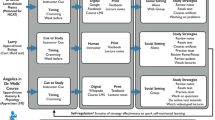Abstract
Effective study habits contribute to good student performance. Universities often provide workshops or guidebooks for new students to learn good study habits. Based on our knowledge of how habits are formed, these approaches to foster study habits are ineffective for many students. We plan to offer intrinsic and extrinsic rewards for them to develop good learning habits and time management. An online tool will reinforce repetitions for desirable study behavior to become habits.
Access this chapter
Tax calculation will be finalised at checkout
Purchases are for personal use only
Preview
Unable to display preview. Download preview PDF.
Similar content being viewed by others
References
Crede, M., Kuncel, N.R.: Study habits, skills, and attitudes - The third pillar supporting collegiate academic performance. Perspective on Psychological Science 3(6), 425–453 (2008)
Hussain, A.: Effect of guidance services on study attitudes, study habits and academic achievement of secondary school students. Bulletin of Education and Research 28(1), 35–45 (2006)
Riaz, A., Kiran, A., Malik, N.: Relationship of study habits with educational achievements. International Journal of Agriculture and Biology 4(3), 370–371 (2002)
Brown, W.F., Holtzman, W.H.: Survey of study habits and attitudes. The Psychological Corporation, New York (1967)
Hurlburt, G., Kroeker, R., Gade, F.: Study orientation, persistence and retention of native students: Implications for confluent education. Journal of American Indian Education 30(3), 16–23 (1991)
Seibel, D.W.: Measurement of aptitude and achievement. In: Whitla, D.K. (ed.) Handbook of Measurement and Assessment in Behavioral Sciences. Addison-Wesley, Reading (1968)
Magno, C.: Predicting grades in Mathematics and English through study habits. The International Journal of Research and Review 5, 40–50 (2010)
Bray, J.H., Maxwell, H.E., Schmeck, R.R.: A psychometric investigation of the survey of study habits and attitudes. Applied Psychological Measurement 4(2), 195–201 (1980)
Weinstein, C.E., Palmer, D.R.: User’s manual for those administering the Learning and Study Strategies Inventory. H&H Publishing, Clearwater (2002)
University of Waterloo: Study Skills Package (2012), https://uwaterloo.ca/counselling-services/sites/ca.counselling-services/files/uploads/files/skills.pdf
Gilbert, S.D.: How to be a successful online student. McGraw-Hill, New York (2001)
Manchester Metropolitan University: Studying Online (2012), http://www.celt.mmu.ac.uk/studying_online/
James Cook University: Learning Skills Online (2012), http://www.jcu.edu.au/learningskills/resources/lsonline/
Hull, C.L.: Principles of behavior: An introduction to behavior theory. Appleton-Century-Crofts, New York (1943)
Hull, C.L.: Essentials of behavior. Greenwood Press, Westport (1951)
Lally, P., Van Jaarsveld, C.H.M., Potts, H.W.W., Wardle, J.: How are habits formed: Modelling habit formation in the real world. European Journal of Social Psychology 40, 998–1009 (2010)
Verplanken, B.: Beyond frequency: Habit as a mental construct. British Journal of Social Psychology 45, 639–656 (2006)
Author information
Authors and Affiliations
Editor information
Editors and Affiliations
Rights and permissions
Copyright information
© 2012 Springer-Verlag Berlin Heidelberg
About this paper
Cite this paper
Au, O. (2012). Study Habits for Hybrid Learning. In: Cheung, S.K.S., Fong, J., Kwok, LF., Li, K., Kwan, R. (eds) Hybrid Learning. ICHL 2012. Lecture Notes in Computer Science, vol 7411. Springer, Berlin, Heidelberg. https://doi.org/10.1007/978-3-642-32018-7_25
Download citation
DOI: https://doi.org/10.1007/978-3-642-32018-7_25
Publisher Name: Springer, Berlin, Heidelberg
Print ISBN: 978-3-642-32017-0
Online ISBN: 978-3-642-32018-7
eBook Packages: Computer ScienceComputer Science (R0)




